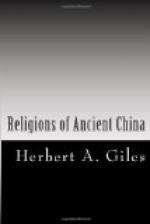It is also a curious fact that throughout the Spring and Autumn, or Annals of the State of Lu, which extend from B.C. 722 to B.C. 484, there is no allusion of any kind to the interposition of God in human affairs, although a variety of natural phenomena are recorded, such as have always been regarded by primitive peoples as the direct acts of an angered or benevolent Deity. Lu was the State in which Confucius was born, and its annals were compiled by the Sage himself; and throughout these Annals the term God is never used except in connection with the word “King,” where it always has the sense of “by the grace of God,” and once where the suzerain is spoken of as “the Son of God,” or, as we usually phrase it, “the Son of Heaven.”
How to bring rain.—In the famous Commentary by Tso-ch’iu Ming on the Spring and Autumn, which imparts a human interest to the bald entries set against each year of these annals, there are several allusions to the Supreme Being. For instance, at a time of great drought the Duke of Lu wished, in accordance with custom, to burn a witch and a person in the last stage of consumption; the latter being sometimes exposed in the sun so as to excite the compassion of God, who would then cause rain to fall. A Minister vigorously protested against this superstition, pointing out that the proper way to meet a drought would be to reduce the quantity of food consumed, and to practise rigid economy in all things. “What have these creatures to do with the matter?” he asked. “If God had wished to put them to death, He had better not have given them life. If they can really produce drought, to burn them will only increase the calamity.” The Duke accordingly desisted; and although there was a famine, it is said to have been less severe than usual.




